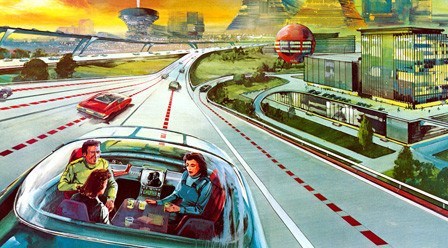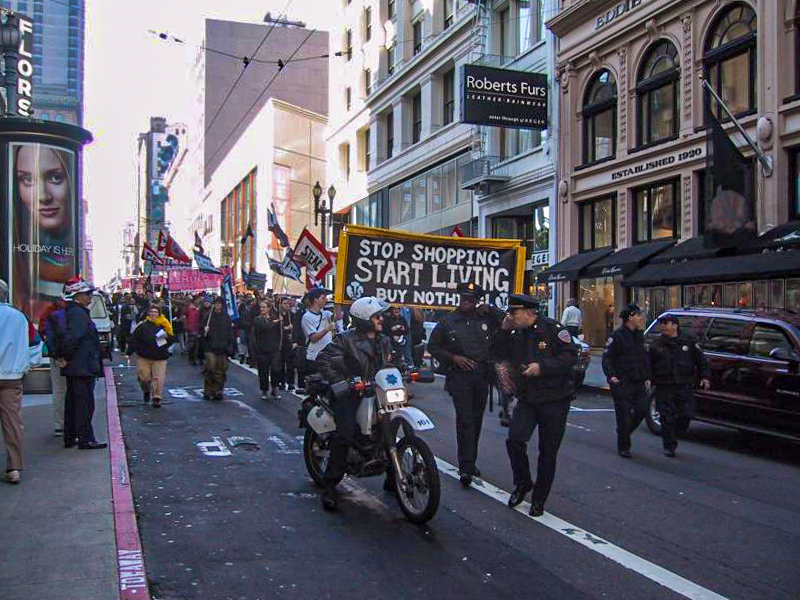
Thousands of people took to the streets of Athens, Greece on May Day to protest the government’s austerity measures. People are panicking in streets all over Europe as higher prices and ever increasing expenses are leaving them stranded in a sea of high unemployment as many feel themselves drowning in the waves of austerity.

People have been protesting the austerity measures in Madrid, in Rome, and in Paris. All these people are saying the same thing: that the philosophy of austerity does not match with their realities. These are not the whinings of spoiled children, these are the cries of hard working families left with no hope and no future.
Governments are betting on the idea that if corporations make enough profit then the free market system will somehow create more jobs. But what they are betting on is never going to happen. Corporations would be stupid to hire expensive workers, even if they make a profit. Also, corporations don’t need so many workers. That is why the workers that they do have are paid so well, especially those in the top management positions.
Why get fifty people to do a job that one person can do with the click of a button? A thousand day traders on Wall Street can be replaced by a single machine running algorithms. Even those outsourced software engineers in India are being replaced with automated software generators. So even where jobs are increasing today due to low wages, all those employees are bound to be replaced by automation in the near future.
Unemployment will only increase
The sad truth is: unemployment will only be going up. There is no way it is ever going to come down. Sorry to burst your bubble. We may be able to temporarily slow it down and reverse the trend but it will always continually go up. Think about it folks. It is just as certain as the fact that real estate prices always goes up. This trend that has started in the developed world will eventually make its way into the developing world. The population is increasing daily and we are predicted to be at a supply of 10 billion people by the year 2050. And thanks to our medical sciences, people over 65 will be the fastest growing demographic worldwide.

Meanwhile, increased levels of innovation and automation are making more and more jobs redundant and obsolete. An entire building devoted to the company’s accountants can be replaced by two people and a computer software. Robotics rule the assembly line. Five people and a 3D graphics program replaces hundreds of Hollywood set designers and special effects artists. Staffed bookstores and record stores are disappearing as fast as one can place an order online and have it delivered to your doorstep. As we progress, demand for workers is bound to go down.
There is no one to blame for this predicament. Unemployed people aren’t lazy. Young unemployed people of the 21st century are very different from the unemployed of the last century. They spend a lot of time learning new things on the internet and working on things that they enjoy. There are even unemployed people sitting around in their parents’ basements all day long helping to make and develop open source technologies. Other unemployed people may be found working on their music albums that will become free downloads for potential fans and appreciators. These days, among the unemployed, there are many hobbyists of one kind or another.
And companies themselves aren’t to blame for the predicament either because they need to grow and develop those higher level technologies that are making the world a better place for people to create and connect with other people.
A dream come true
Actually, this is exactly the kind of world people had imagined for the 21st Century – a place where no-one has to work because everything is taken care of by an advanced technology. A world where people don’t work for money, but for their own pleasure. A world much like the Ancient Greek city of Athens where people were free to roam about and philosophize and conceptualize because they had nothing else to do.
Science fiction writers have dreamed of this scenario for almost a century. Humanistic psychologists such as Maslow, Alderfer, Atkinson and McClelland wrote papers on higher human motivation made possible when working for survival was no longer a necessity. And it seemed that the dream of leisurely work would finally become a reality. And then one day, the dream started to become reality.
So how did this situation turn into such a nightmare?
What we find instead is more and more income inequality where the 1 percent are getting richer and richer and meanwhile the rest of the population is getting poorer and poorer and increasingly unable to meet their needs as they become under employed and unemployed.

This may be a scary thought, but it just might be the case that our economic system is completely wrong for the 21st century. This is because technological advancement and the current employment system for livelihood are diametrically opposed to each other. Yes, you it heard right – in direct opposition!
The old economic system believes that one should earn the right to have food, shelter, clothing, and medicines by doing sufficient labor that would benefit society. For the labor one has given, one will be rewarded with tokens called currency that one can trade for goods and services. This seems like such a noble idea on the surface, but assumes that the world will always need laborers to do the work. This concept never took into account that there could be a time when labor would become completely unnecessary.
So the “job creators” are going to have to be imaginative and think up jobs that can be done by human beings, and then after finding something, they then have to decide whether or not it is a waste of money to hire someone to do that job. Hopefully, it won’t be a waste of money and the employer is going to employ lots of people. This is what the EU Budget Commissioner Janusc Lewandowski seems to be hoping will happen in Europe. As late as May 20th, 2013 Lewandowski still can’t get himself to accept that austerity has serious consistency problems.
On the flip side, if the “job creators” are forced to use human labor, this will stifle technology which in turn will stifle economic growth. It would be like using a steam engine to power a Mac book pro or using a slave galley to fly a Boeing 747.
The solution is that labor and work should no longer be the means by which a person gains sustenance. Society has to give up that fear that people will turn into vegetables if they have no monetary incentive for work. In this modern age, humans will work extremely hard, stay up nights even, for the mere pleasure of it. It is like being a life long college student. There are always new things to learn, more amazing tools to create with, and new discoveries around the corner. College students never ask for a pay raise.
What we need is the exact opposite of austerity! The social systems can and should be expanded from mere safety nets and should be paid for by the “job creators” who are unable to provide new jobs despite their ever increasing profits. Or, God forbid, companies making sufficient profit should hire people to do nothing. Either way, what we need is the unthinkable – that is – the allowance for a large number of the population to freeload off of society.
Why should we do this? Because in truth, because of technology, we live in a world of increasing plenty. There is such increasing abundance that everyone can live a free and prosperous life. There is enough food to feed well healthy meals three times a day the entire world population even though a billion people are starving. With the development of Thorium fuel technology, we would have enough energy to power the entire existence of the human race far into the future and perhaps far out into space. There is no reason why all these benefits should be concentrated on and practically hijacked by only a small percentage of the world population.
We should do this because as counter intuitive as this may be, the job market theory of economics is stifling real growth. It is obsolete and out of touch with reality. As technology develops, abundance increases and jobs decrease.

Therefore there will be less and less consumers and consumption will happen by an 80/20 rule where 80 percent or more of the consumption will be from only 20 percent or less of the population. Companies all over the world already make the 80/20 rule an important part of their marketing campaigns. This not only shrinks the market but also the number of people who benefit from society.
The paradigm shift and austerity inconsistent prices
Now a serious paradigm shift needs to be taken for economies to adjust to 21st century conditions. The concept of work for money has to be questioned. Not all work, for instance, has a direct benefit to the economy or produces capital wealth. Much of the scientific research that will lose funding this year in the US to sequestering cuts are those that have no foreseeable benefit to industry.
Those “lazy” scientists are only freeloading off the “earners” we are made to believe. Yet, how much of our understanding of nature has eventually lead to our modern technology. Why weren’t those scientists of yore paid 21st century market rates by industry for the benefits that took 30, 50, even hundreds of years to realize?
There are also many artists who freeload off of so called “earners” so that they can create art that may benefit society in some intangible way but are not sellable or marketable. The low paid middle school teacher who works more hours than she is paid for is freeloading by living off of tax payers while a ” high earner” like the professional baseball player, who has a fun job, has to take care of her by paying his taxes.
We may have to give up the notion that those who “earn” the money in this system have actually earned it and those who take entitlements are people who feel “entitled.” Perhaps we should consider all workers as volunteers – people who choose how they want to benefit society in one form or another. Some workers volunteer to create capital while others volunteer to be teachers or thinkers or graffiti artists. This way, everyone can be respected equally as if we were all volunteer firemen.
A 21st century economy would make sure everyone is paid with tokens of currency no matter what they did. Just as there is a separation of Church and State, there would be a separation of Work and Pay. It would allow for a society that not only has free thought and free speech, but also free leisurely work. After all, that was the whole point of developing our technological innovations all along. Wasn’t it?
Leave a Reply